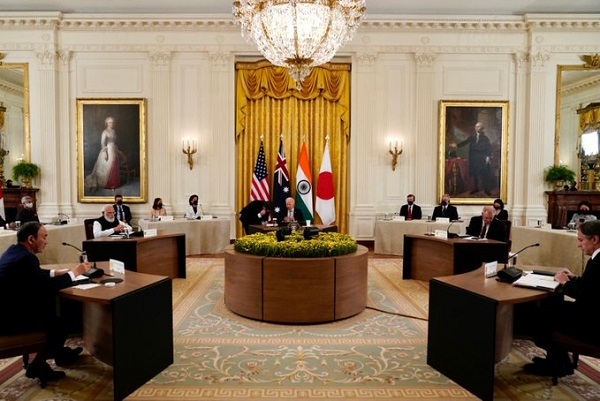
(Samajweekly) The 76th session of the UN General Assembly (UNGA) marks the beginning of a new era in South and Pacific Asian region. The meeting between the heads of state of the Quad nations held on September 24 at the White House marked a major shift in balance of power in the aforementioned regions. India, the US, Australia and Japan are now firmly placed on the world stage to take on Chinese economic and territorial hegemonic expansion as well as Pakistans attempts to export terrorist jihad in the region.
It also sent a strong message to the Taliban and was echoed during Indian Prime minister Narendra Modi address when he said that it was absolutely essential to ensure that Afghanistan’s territory is not used to spread terrorism and for terrorist activities. Modi also warned Pakistan that using terrorism as a “political tool” was an equally big threat for them as well. And quite rightly so. Ever since the Taliban took over Kabul, Pakistan military forces have come under periodic attacks by Tehreek-e-Taliban Pakistan (TTP). And the Afghan Taliban have refused to intervene as a mediator between the Pakistan government and the TTP.
On the other hand, Pakistani Prime minster Imran Khan who chickened out and decided not to attend the UNGA session and a recorded statement instead was exhibited. As always he his tone was hostile. He threatened the global community that if Taliban government was not recognised there would be consequences.
The Prime Minister boasted about reforesting Pakistan through a 10 billion tree plantation drive while illegally cutting down our forests in the Pakistan occupied Jammu and Kashmir (PoJK). At the time when Pakistan illegally occupied PoJK on October 22, 1947, our forests covered 42 per cent of our landmass. Today that figure is reduced to 14 per cent. Our trees are being chopped and sold in the timber black markets in Rawalpindi, Gujranwala and Lahore. It is estimated that Pakistan is robbing us of Rs 52 billion worth of forests annually causing recurring landslides and earthquakes in our region.
Khan informed the session that the gap between the rich and the poor was increasing at an alarming pace due to the plunder of the developing world by their own ruling elite. Well, he forgot to mention that he has given impunity to the military generals who constitute an integral part of Pakistan’s ruling elite and who have been involved in taking kick back and stealing money from development funds and Covid aid received in recent years.
How could a Pakistani Prime Minister’s address to the UNGA not involve India bashing? Khan proved to be no different. While calling RSS and BJP fascists, he praised terrorist late Syed Ali Shah Geelani and demanded that he be reburied in the graveyard of martyrs. He complained that Geelani’s body was snatched from his family and forcibly buried by the security forces. Well, how come Geelani’s corpse was wrapped up in the Pakistani flag?
Taking advantage of �right to reply’, First Secretary of Indian mission in the UN, Sneha Dubey took Khan to task by reminding him that PoJK and PoGB were not only an integral part of Pakistan but demanded that Pakistan vacate the occupied territories immediately.
Claiming that Afghanistan might slip into chaos and become haven for terrorists Khan made demand on the global community to recognised the terrorist regime while Taliban continue to hunt down and in certain cases carrying executions on their doorstep afghans who had helped foreign forces or worked for foreign NGOs.
Like Pakistan, China also did not bother to send their President Xi Jinping in person to address the UNGA’s 76th session. Today, Pakistan and China face global isolation and as Quad
is re-energized and the narrative of growth and reform promoted by Modi is applauded one thing is certain that the 76th session of the UNGA will be remembered as an occasion when the world witnessed a paradigm shift in regional economic and political power balance. South and Pacific Asia now seems readier than ever to take on the axis-of-evil that comprises of China, Pakistan, North Korea and the Taliban government in Afghanistan.
(Dr Amjad Ayub Mirza is an author and a human rights activist from Mirpur in PoJK. He currently lives in exile in the UK.)









